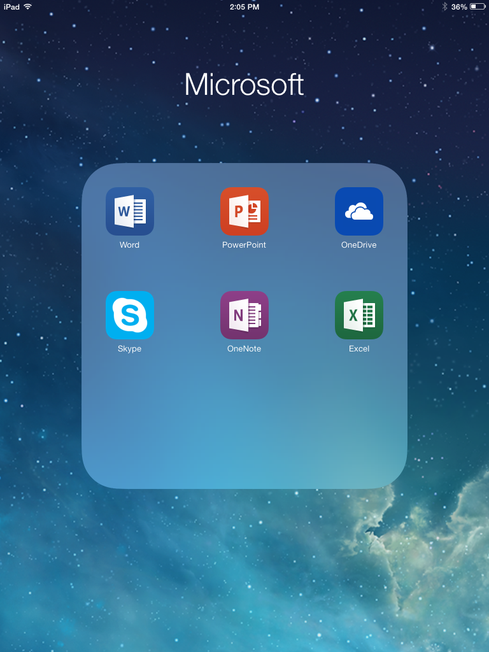Microsoft + Nokia: What's Next?
Microsoft now owns Nokia's handset business, and it must move quickly to offer new mobile devices, apps, and software.

Microsoft Office For iPad: 7 Questions Answered
Microsoft Office For iPad: 7 Questions Answered (Click image for larger view and slideshow.)
It's official: Microsoft now owns Nokia's Devices and Services business unit. The deal, announced in September, closed Friday. Microsoft gains the 25,000 Nokia employees who design and build mobile devices, as well as the services and applications to support them.
Microsoft may have entered the hardware business with its Surface tablets in 2012, but this is an entirely new step. It is now competing directly with Apple and Google in the smartphone market by making and selling devices with its own operating system on board. Microsoft has a lot of catching up to do.
Windows Phone is the third horse in a two-horse race between Android and iOS. Android is making its way around the track, but Windows Phone has barely left the gate. IDC predicts that Google's Android platform will close out 2014 with 78.9% of the global smartphone market. Apple's iOS platform will hold 14.9% of the market, and Microsoft's Windows Phone platform will own a meager 3.9%, though its rate of growth will outpace Android and iOS through 2018. Microsoft may post better numbers in individual markets, but its global figure is still markedly low. Microsoft believes its new ownership of Nokia will help it improve its market share. That remains to be proven.
At last check, Nokia was responsible for approximately 90% of all Windows Phone sales, thanks to its attractive Lumia smartphones. With Nokia's design and manufacturing businesses under its purview, Microsoft can create more seamless products that work even better with its developing ecosystem.
Microsoft said it will continue to license Windows Phone to other OEMs, but there's little incentive for them to make such devices. It's hard to see why HTC, Samsung, and the others should bother to make new Windows Phone devices, given how few they were selling in the first place. Android is a cheaper and more popular option. If Microsoft lost these partners, it would be a blow to the company -- though perhaps a minor one. HTC, for example, has been making Windows-branded hardware for at least 10 years.
One thing Microsoft didn't gain with the acquisition is the Nokia brand. Nokia retained the company name for its remaining network business. However, Microsoft did win the Lumia brand, which is the name given to Nokia's Windows Phones. Microsoft didn't acquire just Nokia's Windows Phones; it also picked up Nokia's Asha line of low-cost hardware for emerging markets and the new Nokia X line, which runs Google's Android platform. Yes, Microsoft now sells Android smartphones.
[Microsoft's Q3 beat expectations. Learn more about Microsoft Earnings: 7 Essential Facts.]
Stephen Elop, Nokia's former CEO, has been tapped to run Microsoft's new phone business. He brings with him Nokia veterans Jo Harlow, Juha Putkiranta, Timo Toikkanen, and Chris Weber. Together, they'll guide Microsoft's handset business forward. Elop, for one, is excited about the acquisition.
"Today is an exciting day as we join the Microsoft family, and take the first, yet important, step in our long-term journey," Elop said in a blog post. "At our core, we are passionate about building technology that will change the world. From [Microsoft's] early vision of placing a PC in every home and on every desk, to Nokia connecting billions of people through mobile devices, we have empowered generations. As Microsoft and Nokia Devices and Services come together as an expanded family, we will unify our passion, dedication, and commitment to bringing you the best of what our joint technologies have to offer. And we are committed to continuing our support for feature phones, the Asha family, and the Nokia X family of devices. Together, we can connect and empower people with one experience for everything in their life in a world where it is mobile first and cloud first."
Microsoft can't waste any time -- and it likely won't. It has built some good momentum headed into the rest of the year. Microsoft recently announced Windows Phone 8.1, which will ship on new smartphones beginning next month. The company announced new low-cost Windows devices that will reach emerging markets in the next month. Windows Phone 8.1 will be delivered to current devices by the summer. Surely, Microsoft has new hardware introductions planned for the July-September quarter to further strengthen its portfolio ahead of the vital holiday quarter.
Satya Nadella, Microsoft's still-new CEO, hopes to provide the company's phone business with the direction and support it needs to grow and better compete with Android and iOS. Time to get to work.
Could the growing movement toward open-source hardware rewrite the rules for computer and networking hardware the way Linux, Apache, and Android have for software? Also in the Open Source Hardware issue of InformationWeek: Mark Hurd explains his "once-in-a-career opportunity" at Oracle.
About the Author
You May Also Like






